Sherrie R. Cronin's Blog, page 3
January 23, 2021
Review: The Code
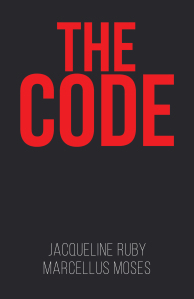 The Code is based on the slick premise that two fictitious characters are allegedly telling the “true story” of how each of them created a celebrity.
The Code is based on the slick premise that two fictitious characters are allegedly telling the “true story” of how each of them created a celebrity.
Although I struggled with the initial concept of an unknown professor appearing sexy for no particular reason when seen on film, I squelched my inner cynic and read on. I’m glad I did as there is much I appreciated about this novel. Compelling writing. Exquisite details about the world of celebrities and those who make them. And most impressive of all, an excellent if unforgiving look at our culture.
One of many great quotes:
“Why do your powerful, rich friends want to know me? They already have everything.”
“They have everything but they never have enough. They’re addicted to novelty and the fulfillment of new dreams. You’re the new flavor.”
I also particularly liked Jessica, Albert’s pretension-adverse wife. She plays a fine foil to his growing immersion in his new life and her drab academic research into André Breton’s novel Nadja makes for an almost eerie comparison to Albert’s growing status as a star.
There were things I liked less, however. I hoped the story would really be told through the eyes of the agents, at least mostly, but it isn’t even close. Although Albert’s agent Jack is involved from the beginning of his tale, most of the telling is done from Albert’s point of view, often involving his thoughts or scenes Jack knows nothing about. Memphis, on the other hand, doesn’t even meet his agent Marcellus Moses till the second half of the book, making the premise even more flimsy with him. I suppose the reader is supposed to believe these two agents somehow know everything, including their creation’s inner monologues, but my ability to suspend disbelief wouldn’t stretch that far.
I found the brutality of the prison scenes difficult to read. I didn’t expect them and might have passed on the book altogether if I’d known. While I agree some of it was necessary to the story, I think even those with more of a stomach for such things would probably have appreciated it if the author had dialed it back a bit.
Like other novels with fascinating premises, the story is difficult to conclude and the only real option is for it to end as a tragedy. The author finds an interesting and unexpected way to do this, though, and it is one that ties everything together and states her thesis one more time. It works.
For more about this book, and the blog tour this review was part of, see The Code.
January 20, 2021
The Power of Poetry
 Her vivacious delivery helped; I loved every minite of her presentation. I also found her use of words clever and even playful in spite of the seriousness of her topic. My favorite was “what just is isn’t always justice.”
Her vivacious delivery helped; I loved every minite of her presentation. I also found her use of words clever and even playful in spite of the seriousness of her topic. My favorite was “what just is isn’t always justice.”Judging from the response on social media, I suspect she won many other non-poetry-appreciators over today, and that her final words “For there is always light. If only we’re brave enough to see it. If only we’re brave enough to be it” will be quoted many times over. I hope they are.
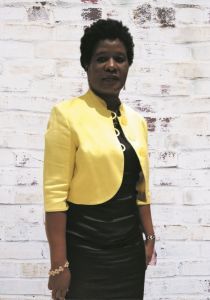 I seldom feature poetry on my blogs, but about a month ago I ran a feature on Utanu Maa, a Canadian peot originally from the Democratic Republic of Congo, and her recent book of peotry entitled
“Rise and Fall of My Beloved”
which she describes as “my own journey into unconditional love and care, and the resilience to deal with pain, loss, grief, to grieve, heal and continue with life after my brother’s death.”
I seldom feature poetry on my blogs, but about a month ago I ran a feature on Utanu Maa, a Canadian peot originally from the Democratic Republic of Congo, and her recent book of peotry entitled
“Rise and Fall of My Beloved”
which she describes as “my own journey into unconditional love and care, and the resilience to deal with pain, loss, grief, to grieve, heal and continue with life after my brother’s death.”My feature was part of a blog tour, and this one was set up so that I recieved a unique piece of her poetry post on my blog. I found it powerful and moving also, and seeing as I’m going on about poetry here, I am going to repost it below. I just want to say, if I keep finding myself exposed to to this kind of quality, I may have to decide I like poetry after all.
An Excerpt Just for Readers of This Blog
The Speech
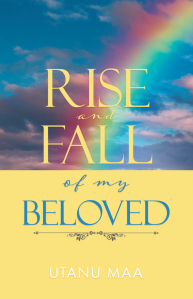 He lacked the speech and was teased, mocked.
He lacked the speech and was teased, mocked.
People regularly targeted, labelled, and bullied him.
They did not believe in his ability to learn and succeed,
They repeatedly told him loudly, in his face
And ears with intent to persuade him about himself.
They predestined him for failure because he was unable to speak.
He remained silent for a long time, listening carefully.
He observed motions on their lips; he absorbed words and sounds.
Then, one early morning, still in bed,
While everyone was in their last dream or nightmare,
And when time had healed and ended his grieving,
The miracle happened: he spoke!
Words and sounds gusted out of his mouth
Like a volcano erupting after a century of long sleep,
He spoke, he spoke, and he spoke volumes!
He talked firmly to himself or maybe to an invisible entity or spirit,
Repeating verbatim words that he had been absorbing:
The same terms used to tease, label, and mock him,
To bully and denigrate him, to silence him and cast him out.
From the bed where I slept, after we were allowed,
I saw him walking outside like a soldier going to war,
Brave and determined to defend his persona with words!
The struggle was out there, and he went to fight it
With his only but most potent weapon: words!
Words used in a common way: verbally, loudly, and firmly.
He knew the power of words, used for any purpose.
Now equally equipped to face the struggle in his early life,
He spoke correctly just as he had observed words on lips,
Using the same words to tease, mock, or intimidate.
To the big disbelief of all, though I had prayed and pleaded
To my ancestors and God that one day he would speak,
Zola had proven at last his ability to pronounce words.
Soon he would go to school to learn words in books,
To write words on a blackboard or in a notebook,
On a wall or on the ground, carving on a tree or on leaves.
Words pronounced in speech to make a statement,
Words spoken with confidence in a native or foreign language,
Words used to argue, defend opinions, convince, and lead,
Words that would further educate and engineer his brain,
Words as a tool to beat all odds and rise exceptionally like a star,
Indeed, words were clearly spoken by his mouth from this point on.
What liberation, relief, blessing, and privilege!
Buy the BookIf you’re interesting in Utanu Maa’s work, you can purchase it at any of these places.
AMAZON.COM https://amazon.com/dp/0228836506AMAZON.CA https://amazon.ca/dp/0228836506
KINDLE https://amazon.com/dp/B08M2DNJHP
BOOKSHOP https://bookshop.org/books/rise-and-fall-of-my-beloved/9780228836506
INDIGO CHAPTERS https://www.chapters.indigo.ca/en-ca/books/rise-and-fall-of-my/9780228836513-item.html
BARNES & NOBLE https://www.barnesandnoble.com/w/rise-and-fall-of-my-beloved-utanu-maa/1138021915
BOOK DEPOSITORY https://www.bookdepository.com/Rise-and-Fall-of-My-Beloved-Utanu-Maa/9780228836506
RAKUTEN KOBO https://www.kobo.com/ca/en/ebook/rise-and-fall-of-my-beloved
SMASHWORDS https://www.smashwords.com/books/view/1051884
APPLE BOOKS https://books.apple.com/us/book/rise-and-fall-of-my-beloved/id1538242460
For the full post about Utanu Maa, which was part of a blog tour sponsored by Goddess Fish, check out Rise and Fall of My Beloved.
January 10, 2021
Review: A Shot of Murder
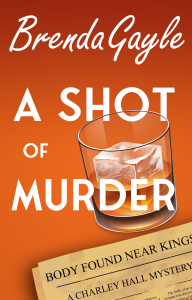 I’m a longtime fan of crime novels and continue to be amazed at the creative ways authors find to put their protagonists into murder investigations. One of the most compelling has got to be having a family member involved and author Brenda Gayle plays this approach like a fine violin.
I’m a longtime fan of crime novels and continue to be amazed at the creative ways authors find to put their protagonists into murder investigations. One of the most compelling has got to be having a family member involved and author Brenda Gayle plays this approach like a fine violin.
I appreciate a novel of any genre that also manages to capture a piece of history, and A Shot of Murder does just that with its interesting view of the soldiers of WWII returning home. Both the soldiers’ trauma and the required adjustments of the women who’ve held down the fort in their absence are examined with sensitivity.
And, I’m also a sucker for stories involving women who just want a chance to use their talents and pursue their dreams. So clearly A Shot of Murder was tailor-made for me.
All in all, it is an enjoyable and easy to read book. The writing is smooth and the pace is quick. Too often I get annoyed at amateur sleuths who come across as annoying busybodies but Charley is both likable and competent as a trained investigative reporter. I enjoyed walking in her shoes and I won’t hesitate to read more books in this series.
For more about this book, and the blog tour this review was part of, see A Shot of Murder.
I chose this book to review because crime novels are my other favorite genre (along with speculative fiction of all sorts.) Someday I hope to write a crime novel.
January 9, 2021
Review: The Foes Between Us
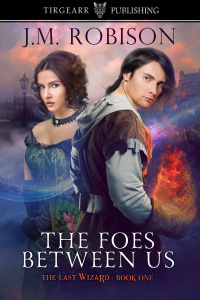 The Foes Between Us is a delightful book with a fine mix of history and fantasy. Much of it revolves around an outdoor-loving young English woman who is poorly-suited to the constraints of her society. The author has added a few twists to the restrictions placed on women in the 1840’s, including a brilliant device wherein women are literally sewn into their dresses and bloomers to keep them chaste.
The Foes Between Us is a delightful book with a fine mix of history and fantasy. Much of it revolves around an outdoor-loving young English woman who is poorly-suited to the constraints of her society. The author has added a few twists to the restrictions placed on women in the 1840’s, including a brilliant device wherein women are literally sewn into their dresses and bloomers to keep them chaste.
The well-drawn characters in this story pull in the reader while an engaging plot that is part treasure hunt and part murder mystery keeps the pages turning. Eventually, a wizard/victim of religious intolerance from three-hundred years earlier joins the story, providing extra dollops of magic to what has only been hinted at before. Much of this tale concerns the social injustices of both time periods, but more than enough parallels to our own time keep the observations relevant.
Author Robison has a far-better-than-average way with words. Deft bits of description pepper sentences driven by high-energy verbs. The story is told in a first-person present-tense voice that adds a sense of urgency to each sentence. I liked the pace at which the plot moves, but have to admit at times her way of telling it wore me out. The occasional inner monologue provides humor and I appreciated those little breaks from the pounding activity.
I recommend this book to those who like historical fiction and to those who enjoy female protagonists with a mind of their own, ones who don’t spend the entire novel lusting after some man. I recommend it to those who enjoy reading about magic, or those who enjoy fantasy. In fact, I recommend this novel to people who simply enjoy a good book.
If more than one of these applies to you, you need to check out this story.
I reviewed this book because I enjoy writing and reading historical fantasy. For more about this book, and the blog tour this review was part of, see The Foes Between Us
December 23, 2020
How do the people in your life influence the characters in your stories?
I’m always fascinated by how much other authors draw on the people they are close to as they create their characters. Recently I got the chance to ask Joanne Guidoccio, author of the women’s fiction novel No More Secrets, what her take was on this issue.
Bits and Pieces of Characters
Having lived and taught in different cities throughout the province of Ontario, I have felt free to “borrow” characteristics from friends, former colleagues, and students to create composite characters in my novels.
That was the modus operandi for the first five novels I wrote: Between Land and Sea, The Coming of Arabella, A Season for Killing Blondes, Too Many Women in the Room, and A Different Kind of Reunion.
While writing No More Secrets, I followed a slightly different path.
Angelica Delfino, the protagonist, is also a composite character. But this time, I borrowed from the Italian women of my mother’s generation. And, yes, I did include bits of my mother’s life. Before she died, Mama read an early draft and commented, “I can see myself here, as well as…” and then she mentioned several relatives and close friends.
The three nieces—Velia, Nora, and Teresa—belong to Generation Y. While sketching their characters, I considered former students but also thought back to my own experiences.
Growing up, I was surrounded by several friends and relatives who resembled Velia, the quintessential good Italian girl who followed the script. While I demonstrated some of her self-discipline and motivation for academic achievement, I didn’t marry at an early age, nor did I choose to stay home and raise a family.
Nora, Velia’s polar opposite, is considered the black sheep of the clan. Impulsive and carefree (at times reckless), Nora has taken many risks in her personal and work lives. Her disastrous marriage barely lasted one year. Often described as a Career ADDer, she experimented with several careers before finding her niche as an interior designer. In my late twenties and early thirties, I did go through a brief period of job-hopping.
Like Teresa, the youngest niece, I settled in Guelph, a mid-sized city in south-central Ontario. We are both introverts and teachers at Catholic school boards, but the resemblance ends there. A theology department head, Teresa is more spiritually inclined. Early in the novel, she speaks wistfully about her missionary work–something I admire but could never do.
Bellastrega, aka Lynn Miller, started off as a minor character. Initially, I intended to have Angelica’s psychic companion appear briefly in the first chapter. All that changed after she started invading my dreams. She ended up with her own POV and full control of the epilogue. Her character was inspired by a psychic in Northern Ontario. While I don’t possess psychic abilities, I do share a common interest with Bellastrega. When I retired twelve years ago, I made wellness a priority in my life. Many of Bellastrega’s comments and suggestions could easily have come from me.
For the full post, which was part of a blog tour sponsored by Goddess Fish, check out No More Secrets.
December 21, 2020
Making Up Words
Every fantasy author has to deal with the dual problems of how much vocabulary to create and how to do it. Recently I got the chance to ask Russell Archey, author of the fantasy novel The Seven Spires, about his approach. He was kind enough to provide this interesting answer.
I didn’t create much vocabulary for the world in The Seven Spires, but I did draw on many sources for naming conventions. Since each kingdom and realm in the book is based on different mythological and fairy tale criteria, I tried to stick with conventions from each respective source.
For example, the Red Kingdom is properly known as Edda. This name comes from the Poetic Edda of Norse mythology. Names like Horodir are meant to invoke such Nordic naming conventions, where others like Vidar are directly related to Norse mythology. One of the most dangerous creatures encountered in the book is the monstrous, worm-like jormungandr who dwell in the Jotun Foothills—both named after creatures from the same mythology. The capital city of Edda? Valgrind, otherwise known as one of the gates of Valhalla!
Some naming conventions are meant to tie characters together, such as the three sorceress sisters who have the ‘æ’ symbol in their names to give them a mystical appeal. Other names and titles were built from various words to create something new. The capital of the Diamond Kingdom, Icostraea, is a combination of “icon” and the Greek goddess of justice and purity, Astraea.
Of course, what fantasy story filled with mythology, fairy tales, and folklore would complete without dragons? I wanted to try something unique with the dragons in this setting. Dragons are rare creatures in Septer (itself named after a word for the number seven and bringing to mind a symbol of authority) and they are named after what I’ve always felt are dragon-type archetypes.
Father Dragon is the progenitor of them all, and as such, each other dragon is referred to as a “dragon-child.” Each dragon-child found a home in a separate realm, making seven total of their kind in the world: Father Dragon, Drake, Naga, Serpent, Wyrm, Hydra, and, of course, Wyvern. Despite their rarity and special, unique natures, not all are still alive at the start of the novel…
As you can see, even though I didn’t create any languages or overly unique vocabulary for the novel, many different languages were used to build the world itself. It’s a great big continent out there!
For the full post, which was part of a blog tour sponsored by Goddess Fish, check out The Seven Spires.
December 19, 2020
The 10-year-old inside me reviews The Ghost of Walhachin
When I started reading The Ghost of Walhachin, I realized I was the wrong person to review this book. I’d agreed to the review because I like historical fantasy and I have a real fondness for gentle ghost stories. I thought it was YA. However, this was a middle-grade book and I soon grew critical of its simple plot and rolled my eyes at the story’s overly-large need to suspend disbelief.
So I reconsidered my approach. This book isn’t written for people like me, I thought. Its intended audience is youngsters who have better imaginations than mine. So, in fairness to the author and to the book’s potential readers, I asked the ten-year-old who still lives inside my head to review the book instead. I’ll be honest. Some of her observations surprised me. Here’s what she thought.
A Review by the 10-year-old in my Head
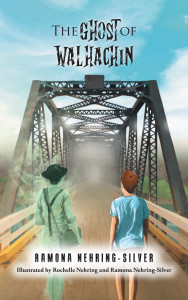 I liked this book. I liked the ghost because he wasn’t scary or mean, just the ghost of a kid trying to get home. I also liked that he was green and green is my favorite color. I liked the part about how he got sent to this town by his mom way back in 1912 but when nobody was there to meet him he died because he ate a bad sandwich on the way.
I liked this book. I liked the ghost because he wasn’t scary or mean, just the ghost of a kid trying to get home. I also liked that he was green and green is my favorite color. I liked the part about how he got sent to this town by his mom way back in 1912 but when nobody was there to meet him he died because he ate a bad sandwich on the way.
I liked the history part, and I liked how in the present day they were looking for something lost long ago. It was like a treasure hunt but not for a treasure.
But, I got kind of confused about how this kid from today could travel back in time just because of the ghost’s memories. Like, was he really back there or not? It seemed to me like he was just inside the ghost’s head but I guess he wasn’t because he worried so much about changing the past and he had to really be there to do that. Didn’t he? But then I didn’t understand how a ghost can turn into a time machine for a real person.
The biggest thing I didn’t like was that there were no girls in the story. I mean most stories are about boys, or at least most of the good ones are, but usually, they have a sister or friend or something who gets to be part of the adventure too only this one didn’t have that so I felt kind of left out. I also didn’t like how so much of the book was about snakes and especially about snakes eating things.
I really liked the ending but I won’t tell you why because I don’t want to give it away. I think you should read the book for yourself. But I will tell you that the best part of it is about how people can be friends and help each other.
For more about this book and the blog tour this review was part of, see The Ghost of Walhachin.
December 1, 2020
And now, a video
Woohoo. Look at this cool 19 second video for my new book. https://t.co/APIUzPZkV5 via @YouTube
— Sherrie Cronin (@cinnabar01) December 1, 2020
October 31, 2020
Review: A Very Witchy Yuletide
I chose to read A Very Witchy Yuletide because it offered me a chance to learn about modern pagan celebrations and the chance to experience the point of view of a legally blind main character. These two potential windows into other worlds overrode my promise to stop reviewing romance novels because I find them too predictable.
[image error]First: the paganism. I’m fascinated by any religion I know little about and I thank the author for her excellent job of introducing the beliefs, customs, and problems of pagans in 2020. The first two were cleverly interwoven into the plot, never leaving me feeling as if information had been dumped upon me. The third, involving persecution of pagans in today’s society, was done with gentleness, showing the tolerant as well as the extremists from mainstream society. For those who claim to be open-minded, or at least fans of freedom of religion, this book is food for thought about the deep-seated biases that still exist against older religions.
Second: the visually impaired main character. The author says she lives with much the same situation as her protagonist, so clearly she writes from a well-informed and a sympathetic point of view. I, however, know far less and was confused when the main character could read a menu by holding it very close, or pick out the shape of a clock hanging over a door. Obviously I know little about the range of impairment included in legal blindness. So although I was inspired by Evergreen overcoming her physical challenges, I was also surprised by how little her situation seemed to impact her or her story. Perhaps that is the point?
Third: the romance. So, most romance novels make me want to scream. Not frustrated obscenities or anything, but something very specific. “Why don’t you two people just talk to each other!” In fairness, everything I’ve ever read by Shakespeare makes me want to scream the same thing, so this is not a specific knock against romance novels.
However, this book didn’t have that effect on me. Why not? It is the classic story of two people attracted to each other who fail to communicate until the last several pages. But here it at least makes some sense. They’ve both finished college and haven’t seen each other for four years, since back when they were shy and confused high school students. Upon meeting, they revert back to that OMG-he-can’t-possibly-like-me frame of mind that is the rightful domain of insecure kids. (Are there any other kind?) They work through this and find the grown-ups they’ve become. Kind of simple, but it worked for me and I liked their story. I mean, nobody should be screaming at kids for feeling insecure, right?
So, this was all around a good read: informative, interesting, and satisfying.
About the Author
[image error]Lieber is an urban fantasy author with a wanderlust that would make a butterfly envious. When she isn’t planning her next physical adventure, she’s recklessly jumping from one fictional world to another. Her love of reading led her to earn a Bachelor’s in English from Wright State University.
Beyond her skeptic and slightly pessimistic mind, Lieber wants to believe. She has been many places—from Canada to England, France to Italy, Germany to Russia—believing that a better world comes from putting a face on “other.” She is a romantic idealist at heart, always fighting to keep her feet on the ground and her head in the clouds.
Lieber lives in Wisconsin with her husband (John) and cats (Yin and Nox).
For more about this book, and the blog tour this review was part of, see A Very Witchy Yuletide.
October 24, 2020
Review: Georgian Romance Revolt
This a funny book. It’s funny in the sense of making you laugh out loud and it’s funny in the sense of being strange and hard to describe. I’ll start with the first.
[image error]Georgian romance novels are ripe for satire and author Lucinda Elliot does a fine job taking aim at all the easy targets like handsome heroes with perfect teeth and some of the more difficult ones like chaperones, forced seduction, and social inequities. She tells her story through the eyes of Elaine, a modern, slightly futuristic woman inhabiting the head of a romance novel heroine. Elaine’s take on this partially-sanitized fictional world provides another layer of humor.
But having two women living inside of one body, often fighting for control of it, is also where the story gets odd. Elaine is in eighteenth-century England by way of a virtual reality entertainment system that malfunctions, adding a sci-fi help-I’m-trapped-in-a-video-game subplot. Because even the best of satire is only funny for so long, I began to enjoy the get-me-out-of-here subplot more than the Georgian-romance-gone-wrong story.
Then it starts to get weird. Without giving away too much I’ll just say the 1960’s author of the original novel gets involved along with Stonehenge, reality, and maybe multiple dimensions. Then Elaine’s own personal life enters the scene as well.
Balancing all this is quite a feat. I think Elliot pulls it off but by the end, I’d have preferred a good bit less of the Georgian romance and a more thorough resolution of everything else.
The author says in her bio that she loves a good laugh. She certainly provided me with several and for that I am thankful. I recommend this book to anyone who likes reading something different and who enjoys satire.
About the Author
 Lucinda Elliot, four times winner of the BRAG Medallion for outstanding self-published fiction, was born in Amersham, Buckinghamshire. When she was growing up, her family lived in various large, isolated old houses in various parts of the UK as they used to renovate such places in the days before it became fashionable. She lived for many years in London and now lives in Mid Wales with her family. She loves a laugh above anything.
Lucinda Elliot, four times winner of the BRAG Medallion for outstanding self-published fiction, was born in Amersham, Buckinghamshire. When she was growing up, her family lived in various large, isolated old houses in various parts of the UK as they used to renovate such places in the days before it became fashionable. She lived for many years in London and now lives in Mid Wales with her family. She loves a laugh above anything.
For more about this book, and the blog tour this review was part of, see Georgian Romance Revolt.



